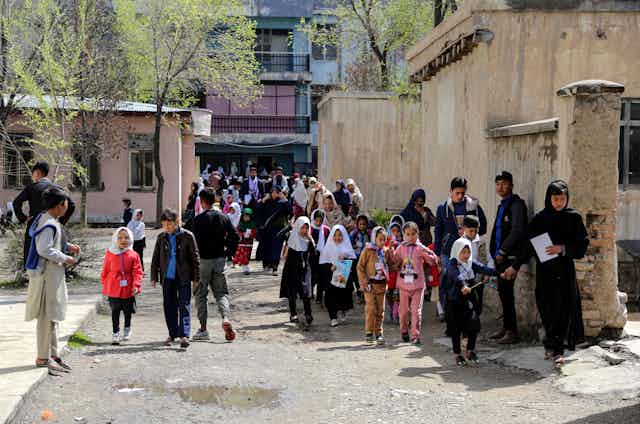The economic and political isolation of Afghanistan since the Taliban takeover in August 2021 has worsened a humanitarian crisis in the country. The World Food Program has projected that between November 2022 and March 2023 the number of food-insecure Afghans would rise to 20 million – 3.2 million of them under the age of five. Some 6 million people were classed in urgent need of assistance.
Arguments that the west should attempt to engage more effectively with the Taliban were mounted throughout the US-backed governments in Kabul which were put in place after the 2001 coalition invasion following on from the 9/11 terror attack on New York.
These were the driving force behind the Doha peace talks in 2018 which led to a deal in which the US agreed to withdraw its forces by May 2021. The US failed to meet this deadline and as the newly installed Biden administration delayed American forces were forced to make a chaotic withdrawal before the Taliban took control of Kabul in August that year.
The Taliban has been designated a terrorist organisation since 2001. Nevertheless, there have been repeated calls for a degree of engagement by the west. Arguments for engagement are twofold. Firstly on purely humanitarian grounds. But also due to the belief that continuing total isolation would lead to the Taliban tightening its already oppressive policies.
Some advocates are arguing that engagement should progress beyond the current focus of merely providing humanitarian support into the political and diplomatic arena. Washington was even poised to open diplomatic channels for the potential recognition of the Taliban regime back in March 2022. But the plan was shelved when the Taliban banned secondary school for girls.
Many of the US sanctions imposed against the Islamic Emirate (IE) have been softened over the past 18 months through the issuing of US Treasury General Licences. These are meant to permit broad financial relations between the US and other countries and entities around the world.
Afghanistan-related licenses since December 2021 effectively allow most financial transactions that involve the Taliban and its affiliate, the Haqqani Network (a group that officially remains under the Taliban leadership but has its own chain of command and semi-autonomy). But direct money transfers to these groups, who are still designated as terrorist entities, remain prohibited.
The IE even received an exemption from the US sanctions regime designed to punish Russian businesses following the invasion of Ukraine. Under GL28, individuals and corporations can continue dealing with Russia’s TransKapitalBank (TKB).
But the 18 months of Taliban rule in Afghanistan indicates that this easing has not been met with any concessions on the part of the Taliban administration. The idea that engagement might be reciprocated by the Taliban appears to have gravely underestimated the group’s determined adherence to its repressive core ideology – even at the cost of ignoring deteriorating realities on the ground.
Afghanistan’s extremist rulers have intensified their repressive policies rather than reacting positively to the easing of sanctions. This has been particularly marked in the case of policies relating to women, as the table below shows:

Kabul has meanwhile received more than US$3.7 billion (£2.98 billion) from donor countries during 2022 – close to one-third of it from the US. This is less than half of the more than US$8bn that the former western backed republic received annually before 2021. But it indicates that there is still a degree of international goodwill that any less oppressive regime could make better use of.
Is the Taliban playing ball?
Reluctance among the Taliban’s leadership for genuine engagement can be seen in the fact that the Taliban office in Doha, Qatar, which was instrumental in negotiating the US withdrawal agreement in February 2020, has been marginalised since the takeover. The man who led the talks from the Taliban side between 2015 and 2020, Sher Mohammad Abbas Stanikzai – who has been critical of the way the regime is treating girls – has been downgraded to the relatively obscure post of deputy minister of foreign affairs.

Administration of the Taliban’s government is now firmly in the grip of Hibatullah Akhundzadeh, who has shifted the group’s power base to southern Kandahar province, where conservative loyalists tend to dominate. He is now seen as having consolidated his faction’s grip on the IE’s domestic and regional policy.
Akhundzadeh’s attitude to women could be seen in his refusal to meet UN deputy director-general Amina Mohammad – the UN’s highest-ranking woman – when she visited in January, chiefly to engage the regime’s leadership.
Prominent women’s activist, Mehbouba Seraj – who has been shortlisted for the 2023 Nobel Peace Prize – remains an advocate of engagement with the Taliban. “If we don’t sit down and talk to them and see what it is exactly that we can do and they can do, the ones who are going to be paying for it, and who are paying a huge price, are the poor people of Afghanistan, the women and children,” she said in February.
But realities on the ground since August 2021 show that ideological extremism cannot be countered by wishful thinking. Any continued western engagement should come with a price tag for the IE, not offered on the cheap. It should be based on clear communication of reforms by the regime, particularly to improve the conditions for women and an entire generation of girls who are being denied an education.

